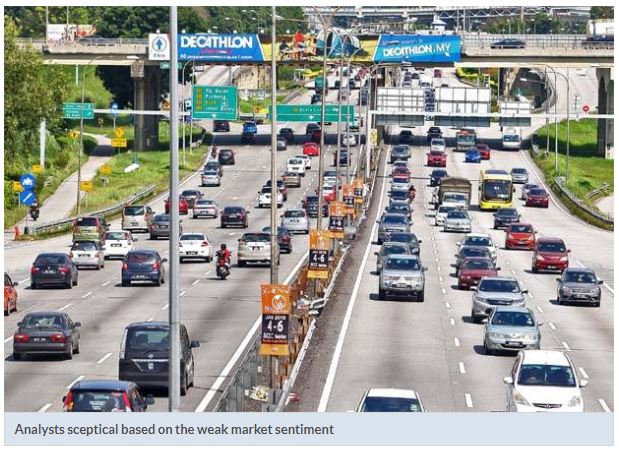Malaysia: Vehicle sales expected to grow 9% this year
PETALING JAYA: The Malaysia Automotive Robotics and IoT Institute (MARii), an agency under the International Trade and Industry Ministry, has forecast total industry volume (TIV) to grow 9% to 610,000 units this year despite scepticism that the local automotive industry will be affected by the current weak market sentiment.
At a briefing earlier this week, MARii chief executive officer Datuk Madani Sahari said the growth forecast was done last month, prior to the Covid-19 outbreak.
“We have factored in many variables and believe that we can hit that target, ” he says, adding that MARii is hopeful that the Covid-19 pandemic will ease eventually.
Madani considers Malaysian vehicles the cheapest in Asean and that there is no reason why buyers should be put off by the prices, adding that total production volume is expected to grow to 577,348 units this year from 571,632 units in 2019.
There will also be a continued increase in terms of energy efficient vehicle penetration, at 90%. In terms of exports of parts and components, including re-manufacturing, the value is expected to contribute RM16bil this year, ” he says.
MARii is optimistic that TIV can achieve an average growth of 9% a year over the next decade to hit 1.22 million units in 2030, when the current annual growth rate is barely 2%.
Some local pundits believe that it would be a real tall order for the local automotive industry to achieve an annual growth rate of 9%.
“TIV hit 605,000 units in 2010. It hit a high of 666,677 units in 2015 and then contracted to 580,085 units the following year. It fell to 576,625 units in 2017, before picking up 3.8% in 2018. It didn’t even surpass 2% in 2019, ” said an analyst.
Another analyst concurred that it would be difficult to achieve an annual growth rate of nearly 10%.
“After 10 years, we’re actually back to the same TIV level of 2010, ” he said.
Last month, the Malaysian Automotive Association (MAA) announced that TIV finally exceeded 600,000 units in 2019 after failing to surpass that mark for three consecutive years, rising 1% year-on-year to hit 604,287 units.
For 2020, the association is projecting TIV growth of less than 1% to 607,000 units.
TIV got off to a weak start this year, with vehicle sales contracting 12% year-on-year in January to 42,652 units.
MIDF Research, in a recent report, said although this may have been largely due to January being a shorter working month (as a result of the Chinese New Year festivities), it does not rule out the possibility of some sort of weakness in underlying demand playing out.
“Proton and Toyota staged commendable growth in January, outperforming the industry’s contraction.”
The research house is maintaining a cautious outlook for the automotive sector this year.
“The Covid-19 outbreak has not impacted the domestic auto sector so far, though we note that players such as Proton and Sime Darby have direct supply and demand exposure respectively to the Chinese automotive value chain.
At the launch of the National Automotive Policy 2020 earlier this month, MAA president Datuk Aishah Ahmad revealed that some of the association’s members had been affected by the Covid-19 outbreak.
“Chinese car companies, especially, will be impacted because their supply chain will be affected. Hyundai and a number of other brands have already announced that production has been halted because their parts are coming from China, ” she said.
For now, Aishah said it’s still too early for the MAA to revise its 2020 forecast, unless the situation worsens.
In a report earlier this month, MIDF Research said the local automotive sector is unlikely to face supply disruption in the wake of the Covid-19 outbreak, despite having direct exposure to China.
“Component supply is a risk, given the complex automotive value chain and impact on downstream output.” The research house emphasised, however, that unlike natural disaster-driven crises such as the 2011 Japan earthquake and the Thai floods, supply disruptions could recover quickly as infrastructure and inventories remain intact.
“Malaysia’s major source of completely-knocked-down kits and components, namely Thailand, has exposure to auto part imports from China, but mainly for replacements and supply to Chinese original equipment manufacturers’ local assembly, ” it said.
The research house says consensus gross domestic product growth forecasts have already been revised downwards earlier this year, after a surprise under-performance in the fourth quarter of 2019.
“For now, our 2020 TIV is maintained at a flattish 0.2% year-on-year growth. Among the key players, both Proton and Perodua are expected to launch their B-segment sport-utility vehicles this year, while Honda’s City and Jazz as well as Nissan’s Almera are due for replacement.”
Source: https://www.thestar.com.my/business/business-news/2020/03/09/vehicle-sales-expected-to-grow-9-this-year


 English
English






